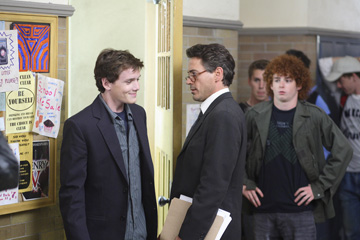CHARLIE BARTLETT

Reviewed by Sam Hatch
Charlie Bartlett is a quirky little film that could have been so easy to hate (much in the way I loathe Rushmore) if it weren't for its abundance of charm. Anton Yelchin (Huff, Curb Your Enthusiasm) embodies the title character, a frail looking kid who's too cool for school and too smart for his own good. His self-hatred is fueled by a mysteriously absent father, and is disguised by a plethora of zany antics and a false projection of confidence. His mother (played oh-so-out-of-it by the delightful Hope Davis) deals with his shenanigans by medicating herself and routinely attempting to be his friend instead of his parent.
She also happens to be rich enough to shuffle him from one private school to another as his outrageous behavior routinely merits a prompt expulsion. His latest ruse involves running a fake i.d. racket in the name of gaining as many friends as possible (I wonder if he printed any McLovin licenses…) With all options of attending private learning academies exhausted, the only place left for Charlie is public school. Once there, he promptly becomes the bane of Principal Gardner's (Robert Downey Jr.) already troubled existence.
Bartlett's smartypants demeanor is softened by moments such as the one in which he genuinely befriends a handicapped child on the short bus. He has a hard time fitting in, and finds himself the target of resident bully Murphy Bivens (Tyler Hilton), who later becomes his business partner. In one bonkers move, Charlie encourages Murphy to sell video footage of him beating kids to a pulp (Bartlett included), and donating the proceeds to the victims.
Charlie's biggest scam, however, is his decision to play therapist to his fellow classmates. After sending a school party through the roof with a spare bottle of Ritalin, Charlie begins fooling his ethically lacking family shrink into prescribing him all manner of therapeutic pills. He and Murphy stage their business in the school bathroom (kind of like Clint Howard in Rock and Roll High School). Eventually, his list of clients includes Principal Gardner's own daughter Susan (40 Year Old Virgin's Kat Dennings).
The script by Gustin Nash is wildly uneven, and wears its devotion to Hal Ashby's Harold and Maude on its sleeve. Charlie Bartlett even goes so far as to make the Cat Stevens tune Don't Be Shy (which was originally written for Ashby's film in 1971) a pivotal element. Charlie isn't quite as death-obsessed as Bud Cort's Harold, and primarily comes off more akin to Ferris Bueller. At times it seems as if he's channeling a young Matthew Broderick, especially when he goes on a humorous and hyperactive drug-fueled tear following an overdose on Ritalin.
This film concentrates more on life's repercussions than that John Hughes classic, for soon enough Charlie begins to realize that his psychiatric skills gleaned from books might not be up to the task of treating his suicidal classmate Kip Crombwell (the very good Mark Rendall). These hard truths are what torment his Principal, who refuses to become as enthralled with the kid as the rest of the school has.
The weird relationship between these two may mirror the Bill Murray/Jason Schwartzman dynamic from Rushmore, but I thought it yielded more fruit in this case. Though for all of Yelchin's fascinating work, oftentimes he can't carry the scene when he's going tete a tete with Downey. The latter actor once again portrays an alcoholic (can that be healthy for a recovering addict?), following recent addiction fueled roles in A Scanner Darkly and Zodiac. Hell, in his next film he gets to play Tony Stark in Iron Man, the only alcoholic character I can recall from the Marvel Comics pantheon.
The friction between these two characters brings about much discussion of responsibility versus the unbridled nature of youth. Fellow classmates begin treating Bartlett as their guru (again like Bueller, or Happy Harry Hard-on in Pump Up The Volume), giving him the much-desired attention he's been after all along. When his Mother tries telling him that there are more important things to High School than being popular, his query of “Like what?” is met with a lack of a solid answer. He literally dreams of attaining the cult of personality, for the movie begins with him greeting a legion of fans in his sleep. During waking hours, the film wisely questions the need for that attention, and forces Charlie to discover why he acts the way he does.
Pump Up The Volume is also spiritually close to the scenes here that surround the kids' free-time student loft. There's a post-Columbine state of constant subjectivity and distrust, and the students begin to boil once their every move is captured on videotape. I don't recall having that much time to ‘hang out' during high school hours, but I'm sure I would have been equally enraged by the seemingly Draconian steel-fisted rule of this faculty.
The script has a tendency to wrap things up too easily - for the team-up with the bully feels a tad forced, and multiple kids' demons are completely purged through the production of Kip's school play “Hell Comes With Its Own Locker”. Still, its intentions are pure. Some of the quirkiness is affected, in that it's trying a bit too hard to be different. Jared and Jerusha Hess' Napoleon Dynamite was also guilty of this, and Wes Anderson's work carries it to such extremes that the trailers alone for his films make me want to either vomit or slap him senseless.
Despite this tendency, Charlie Bartlett hits most of its marks. While it never rings quite as true as say Superbad, there's a sweetness at its heart that makes it hard to rally against. It follows in the footsteps of countless other tortured teen sagas, but at least in this case Charlie Bartlett proves to be something more than the sum of its borrowed parts.